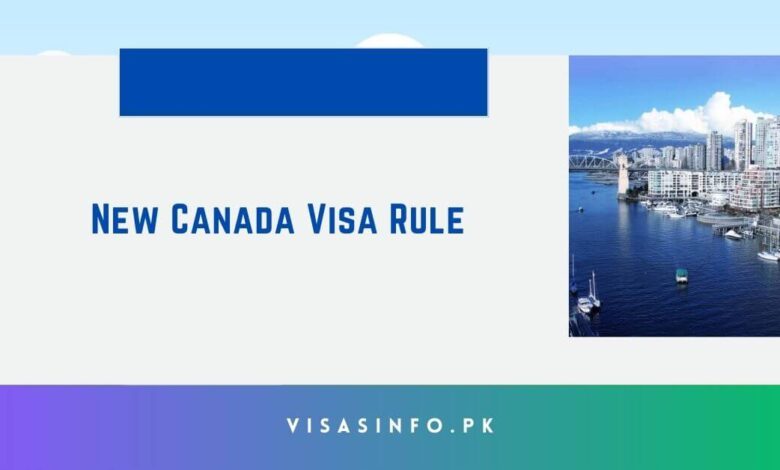New Canada Visa Rule 2024 – Check Here

It has always been a thrilling concept to embark on an educational journey in Canada, and prospective international students will now have to navigate a new set of laws that are designed to enhance the experience. In this comprehensive guide, we analyze the most recent changes to the Canadian student visa application process, offering you a comprehension of the innovative measures implemented to safeguard the system’s integrity.
Join us as we investigate the intricacies of the recently amended legislation that will impact the future of studying in Canada, regardless of whether you are a prospective student or a mentor to others on this educational path.
This is particularly wonderful news for students who aspire to study in this breathtaking nation, as it originates from the center of Canada. We are not present to discuss the weather as snow blankets the City of Calgary; rather, we have some exciting news that will bring joy to prospective international students.
The Canadian Immigration Scene
The immigration laws in Canada are undergoing a significant transformation, and this update, which will be implemented on December 1, 2023, will have an impact on all prospective international students who wish to pursue their education in the country. Canada’s Minister of Immigration, Mark Miller, has issued a groundbreaking declaration to combat fraud in the verification of acceptance letters for international students.
All Canadian postsecondary-authorized institutions will be required to verify the acceptance letters of each candidate starting on December 1, 2023. This implies that the immigration service will meticulously review the acceptance letter submitted by an applicant before issuing a study permit.
The validation procedure aims to improve security measures against fraudulent activities for international students.
Significance of Designated Schools
To protect international students from fraudulent organizations and immigration consultants, it is imperative to implement a rigorous verification process. Numerous students allocate substantial sums of money to their academic pursuits in Canada, which includes tuition fees and other expenses. Nevertheless, certain private institutions may not be acknowledged as such, which could result in complications following graduation, such as the inability to obtain a work permit.
Advantages for Prospective Immigrants
It is imperative for individuals who intend to relocate permanently to choose a Designated School. Students who attend specific educational institutions may submit applications for work permits and, ultimately, permanent residency. A work permit that permits international students, particularly those with families, to work while they are studying and bring their families with them, is known as an open work permit.
This regulatory modification is a positive development in the preservation of the Canadian educational system’s integrity and the protection of the rights of international students. Prospective students are advised to conduct thorough research on the accreditation of the institution they select before traveling to Canada to pursue their education.
To obtain further information regarding student visas and to learn more about these modifications, we recommend visiting the official Canada website (www.canada.ca). The dream of studying in Canada has been further enhanced by the implementation of additional security measures, rendering the journey to a degree and eventual permanent residency all the more appealing.
Despite the perceived difficulty of navigating these changes, aspirant students can successfully navigate the academic landscapes of Canada by leveraging their knowledge and making well-informed decisions.
Benefits of the New Canada Visa Rule
- Improved Processing Times: Recent updates have been implemented to enhance the processing times for a variety of visas, such as student and visitor visas. This results in reduced wait times for applicants and faster decisions.
- International Student Permit limit: The new rule to limit international student permits can help balance immigration intake and ensure that those who receive study permits have access to quality education and employment opportunities post-study.
- Expanded Eligibility: Certain new visa regulations, including modifications to work permits and LMIA exemptions, establish more expansive eligibility requirements, thereby simplifying the process of employment for foreign nationals in Canada.
- Visitor Visa Flexibility: New visitor visa regulations, such as extended stay periods and more flexible re-entry options, enable visitors to remain in Canada for extended periods without the necessity of submitting additional applications.
- Spouse Open Work Permits: Canada’s recent policies have increased the availability of open work permits for the spouses of visa holders, thereby facilitating easier family reunification and access to the labor market.
- New Immigration Pathways: Canada is consistently introducing and updating new immigration pathways, such as provincial nominee programs (PNPs), which facilitate permanent residency.
IRCC’s Most Recent Updates on Canada Visa Processing Time
A comprehensive guide that will assist you in completing the application process for Canadian student and work visas. Traveling to Canada to study or work is an exhilarating prospect, and a smooth transition is contingent upon your understanding of the intricacies of the visa application process.
We will investigate the various aspects of obtaining a student visa to Canada, investigate the success rates, and delineate the available work permit options that spouses may pursue. In addition, we will investigate the opportunities that initiatives like the Rural and Northern Immigration Pilot (RNIP) provide to individuals who are seeking permanent status in Canada.
Check Also: Latest Changes to Canada Visitor Visa – Check Here
Canadian Student Visa Application Process
The process of obtaining a Canadian student visa can be both thrilling and intimidating. The tourist visa application process is typically scheduled for May or June; however, the total processing time may vary. While revising their immigration status, applicants have the option to enroll in a university or college.
To make well-informed judgments regarding visa success and travel schedules, it is recommended that one remain informed about the most recent updates from immigration authorities.
Applications for Student Visas
In recent years, the success rate of student visa applications has been significant, with a range of 65% to 70%. This high acceptance rate should serve as an incentive for prospective scholars. Universities and institutions are indispensable in aiding students with the application process by offering guidance and financial assistance.
Applicants have sufficient time to coordinate their academic schedules, as the process typically lasts six weeks.
Spousal Open Work Permit
The provision for spouses to possess open work permits is a notable aspect of the immigration laws in Canada. Typically, it takes 20 to 30 days to obtain a spousal open work permit. This enables couples to work in Canada while their partner pursues their education. This clause is available to spouses and other members of their immediate family.
Applicants must satisfy particular criteria to qualify for a spousal open work permit. This requires demonstrating your capacity to provide financial support to the primary applicant, a clear criminal record, and a sincere desire to work. An application must be able to comprehend and satisfy these criteria to be accepted.
Work and Study Permits
In addition to student visas, Canada also offers work permits for individuals who wish to gain work experience while in the country. A study work permit is available for individuals who intend to work part-time while pursuing their education. Applicants are required to submit evidence that they are complying with the regulations established by immigration authorities. This necessitates maintaining consistent employment, maintaining financial stability, and adhering to the purpose of their presence.
Rural and Northern Immigrant Pilot (RNIP)
The Rural and Northern Immigrant Pilot (RNIP) provides a unique pathway to permanent residency in Canada for individuals who possess specific professional qualifications and have low IELTS scores. If candidates possess a bachelor’s degree and have worked in high-demand industries such as mining, construction, maintenance, or air conditioning building, they may apply for permanent residency directly.
The RNIP program is designed to attract competent laborers to the rural and northern communities of Canada. Candidates may explore the possibility of obtaining permanent residency for themselves and their families if they satisfy specific criteria, such as obtaining a trip 7 IELTS score. In addition to addressing the labor shortages in these regions, this program enables immigrants to establish a livelihood in smaller villages.
Numerous factors must be meticulously assessed when applying for a visa to Canada. It is imperative to be aware of the regulations and meet the prerequisites, regardless of whether you are pursuing a student visa, spousal open work permit, or exploring your options under the RNIP program.
Despite the availability of a diverse array of work permits and permanent residency options, Canada remains a highly sought-after destination for individuals seeking employment and educational opportunities. Additionally, student visa applications have a success rate of 65% to 70%.
Frequently Asked Questions:
-
What is the new immigration rule in Canada?
Under the Levels Plan, Canada will implement new immigration rules in 2023-25. The plan aims to enhance the number of immigrants entering the country and equip them more effectively to enter the workforce and contribute to the economy.
-
What is the new visa program for Canada?
Canada is looking for talented entrepreneurs who are interested in starting businesses that will stimulate the Canadian economy while creating employment opportunities for its citizens. Entrepreneurs may immigrate to Canada through the start-up visa program.
-
What is the 90% rule for newcomers to Canada?
You meet the 90% rule if, in the part of the year before you moved to Canada, you didn’t earn any foreign-source income. 90% or more of your income came from Canada.



